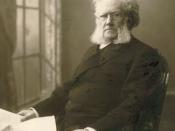Realism: History repeating itself?ÃÂTrue realism consists in revealing the surprising things which habit keeps covered and prevents us from seeing.ÃÂÃÂ Jean CocteauIn 1879, Henrik Ibsen introduced a concept in his play A DollÃÂs House which would change the world of theatre forever: realism. The days of romance, melodrama and predictability were forced out the door to make way for surprise, intrigue, and real-life situations presented without any kind of sugar-coating. He shocked his audiences by presenting to them true life as it really happens, and because of the Victorian morality that enveloped the nation it was not well received. People disliked seeing truth on-stage in what Ibsen himself called a ÃÂcontemporary tragedy,ÃÂ as it was taboo to have families who were not perfectly happy, women who had power, or couples who didnÃÂt love each other unconditionally. ÃÂIbsen was greatly concerned that in his contemporary dramas the theatre audience (and readers) should be witness to trains of events that could just as easily have happened to them.
This required that the characters in his dramas spoke and behaved naturally and that the situations had the stamp of being everyday life about them.ÃÂ (Meyer 154)Over a hundred years later, a similar event occurred in which something which was previously taboo and inappropriate unleashed itself wholly on the public, with the same insurmountable controversy: videogames. Henrik Ibsen knew his realistic writing would have an effect on society in his lifetime, but he had no idea that his legacy would continue on to influence the gaming world. Despite the time difference, present day societyÃÂs reaction to realism in videogames, such as Grand Theft Auto and Call of Duty, mirrors the events which took place in the late 19th century, with only a handful of dissimilarities, and the initial shock will slowly fade away as...


